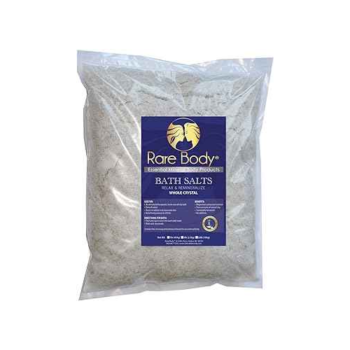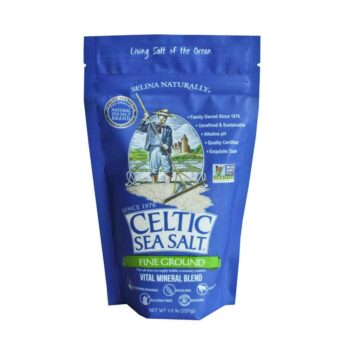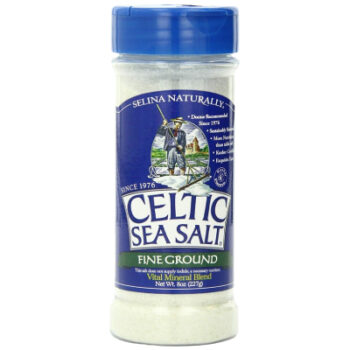Unlocking Celtic Salt Benefits: 5 Health Secrets
Celtic salt isn’t just for seasoning. Beyond its flavor, it offers significant health benefits that many are unaware of. In this guide, Celtic Salt Benefits : Unlock 5 Powerful Health Secrets, we’ll explore how this ancient mineral can enhance wellness. Here’s what you’ll discover:
- Hydration Support: Learn how Celtic salt helps maintain optimal hydration levels.
- Mineral Richness: Uncover the wealth of essential minerals in Celtic salt and their health implications.
- Health Enhancements: See how incorporating Celtic salt can benefit your overall health.
- Expert Opinions: Get insights from health experts on why Celtic salt stands out.
- Practical Tips: Learn how to use Celtic salt effectively in your daily routine.
Let’s dive straight into the world of Celtic salt and discover how this ancient mineral can make a significant difference in your pursuit of a healthier lifestyle.
Table of Contents
1. The Comprehensive Health Booster
Celtic salt, often praised for its distinctive flavor and texture, is more than just a culinary enhancer. This natural wonder, harvested from the pristine coastal regions of France, carries with it a treasure trove of health benefits that can play a pivotal role in optimizing your wellness. Below, we explore the Celtic Salt Benefits asking “what” and “why” of Celtic salt’s impact on health, answering the crucial question: What are the benefits of taking Celtic salt?
Mineral-Rich Composition
Celtic salt stands out in the world of seasonings for its exceptional mineral-rich composition. Harvested traditionally from the coastal regions of France, its natural, unrefined state preserves over 60 trace minerals. These include vital nutrients such as magnesium, which plays a key role in over 300 enzymatic reactions within the body; potassium, essential for muscle and nerve function; calcium, crucial for bone and teeth health; and zinc, which supports the immune system and wound healing processes. These minerals are not just present; they are bioavailable, meaning they’re in a form that the body can easily absorb and utilize, enhancing their beneficial impact on health.
In stark contrast, regular table salt undergoes a rigorous refining process. This not only strips away the majority of its natural minerals but also involves the addition of anti-caking agents and sometimes dextrose (a type of sugar) to prevent clumping. Table salt typically contains one predominant mineral, sodium chloride, at a much higher concentration than found in natural salts. While sodium is necessary for bodily functions, such as maintaining fluid balance and transmitting nerve impulses, its excessive intake is linked to adverse health effects, including hypertension and an increased risk of heart disease.
Moreover, table salt processing often includes adding emulsifiers and sometimes bleaching agents to achieve a white, uniform appearance. These additives do not contribute any nutritional value and, in some cases, may pose health risks when consumed in large amounts over time.
The high sodium level in table salt, combined with the lack of beneficial trace minerals and chemical additives, makes it a less healthy choice than Celtic salt. The latter’s mineral diversity contributes to its unique flavor profile and offers a spectrum of health benefits. By choosing Celtic salt over regular table salt, individuals can decrease their intake of unnecessary additives and increase their consumption of essential minerals, thereby supporting overall health and well-being in a more natural and holistic manner.
Hydration and Electrolyte Balance
One of the key benefits of Celtic salt is its ability to help maintain a proper electrolyte balance in the body. This is crucial for optimal hydration, as electrolytes are responsible for regulating fluid balance, pH levels, and muscle function. Adding a pinch of Celtic salt to your water or meals can enhance your hydration status, which is especially beneficial for athletes or anyone engaged in regular physical activity.
Detoxification Properties
Celtic salt’s mineral density also contributes to its detoxifying effects. It helps to draw toxins out of the body, promoting the natural detoxification processes of the skin and kidneys. This can lead to improved digestion, a stronger immune system, and a healthier, more radiant complexion.
Improved Digestive Health
The trace minerals in Celtic salt can stimulate the production of digestive enzymes necessary for breaking down food and absorbing nutrients effectively. Regular consumption of Celtic salt can, therefore aid in digestion and help prevent common digestive issues such as bloating and constipation.
Blood Pressure Regulation
Despite the common belief that salt raises blood pressure, Celtic salt can actually help to stabilize it. Thanks to its balanced mineral content and lower sodium chloride levels compared to table salt, it can be part of a healthy diet for those monitoring their blood pressure.
Incorporating Celtic salt into your diet is straightforward and can yield significant health benefits. Whether used in cooking, as a finishing salt, or dissolved in your morning glass of water, its inclusion is a simple yet powerful way to boost your overall health. As we’ve uncovered, the celtic salt benefits of taking Celtic salt, it’s clear it extends far beyond its taste, offering a holistic approach to wellness that supports both body and mind
2. The Hydration Enhancer
Hydration is a cornerstone of good health, yet it’s importance often goes underappreciated. Water is essential for virtually every bodily function—it transports nutrients and oxygen to cells, aids digestion, flushes out toxins, and keeps our skin healthy and vibrant. However, maintaining optimal hydration levels involves more than just drinking water; it requires a delicate balance of electrolytes, which are minerals in your body that carry an electric charge and are crucial for hydration, nerve impulses, muscle function, and pH balance.
Celtic Salt’s Unique Contribution to Hydration
Celtic salt emerges as a powerful ally in the quest for proper hydration due to its rich electrolyte content. Unlike traditional table salt, which mainly offers sodium chloride, Celtic salt brings a spectrum of electrolytes, including magnesium, potassium, and calcium—each playing a vital role in hydration and overall health.
- Magnesium is key for energy production and helps with the absorption of other minerals.
- Potassium regulates fluid balance and controls the electrical activity of the heart and other muscles.
- Calcium is not only crucial for bone health but also necessary for the proper function of the heart and muscles.
These minerals in Celtic salt work synergistically to enhance the body’s hydration status. When dissolved in water, Celtic salt can help to replenish electrolytes lost through sweat, support the body’s natural balance of fluids, and prevent dehydration. This is particularly important for individuals engaged in strenuous activities or those living in hot climates, where the risk of electrolyte imbalance increases.
The Biological Effects of Improved Hydration with Celtic Salt
Integrating Celtic salt into your hydration routine can have profound biological effects. For one, it can improve your body’s ability to retain water in the right amounts, ensuring that cells function efficiently. This enhanced water retention is crucial for preventing dehydration, which can lead to fatigue, headaches, and decreased physical performance.
Moreover, the balanced electrolyte levels supported by Celtic salt intake can improve nerve function and muscle contraction. This is because electrolytes are essential for transmitting signals throughout your body, including those that govern muscle movements and heartbeats. By maintaining a healthy electrolyte balance, you can help safeguard against cramps, muscle spasms, and irregular heart rhythms.
Finally, the trace minerals in Celtic salt, by supporting hydration, also play a role in detoxifying the body. Proper hydration ensures that the kidneys can filter waste effectively, while also supporting healthy digestion and promoting skin health through moisture retention and toxin removal.
Incorporating Celtic Salt for Optimal Hydration
Adding a pinch of Celtic salt to your daily water intake is a simple yet effective way to boost hydration and electrolyte levels. This can be especially beneficial in the morning to kickstart your day or after exercise to replenish lost minerals. Remember, though, moderation is key, as with all dietary minerals.
Through its unique mineral composition and natural harvesting process, Celtic salt offers a holistic approach to hydration that goes beyond simply increasing water intake. By understanding and leveraging Celtic salt’s role in water balance, we can unlock the secret to enhanced hydration and improved overall health.

3. The Nutritional Treasure Chest
Celtic sea salt is more than just a seasoning; it’s a nutritional powerhouse harvested from the pristine shores of the Celtic Sea, where the process has remained unchanged for centuries. This section dives into the origins, unique properties, and rich mineral composition of Celtic sea salt, shedding light on why it’s considered a treasure chest of nutrition and an essential component for maintaining optimal health.
Origins and Traditional Harvesting Methods
The story of Celtic sea salt begins in the coastal areas of France, where it is harvested using age-old techniques that date back to the Iron Age. The process involves channeling seawater into shallow clay ponds, where the sun and wind evaporate the water, leaving behind salt crystals. This method preserves the natural balance of minerals found in seawater, unlike the industrial processing of table salt, which strips away valuable minerals and adds anti-caking agents.
Unique Properties of Celtic Sea Salt
What sets Celtic sea salt apart are its unique properties:
- Moisture: Celtic sea salt retains a natural moisture, indicating it has undergone minimal processing. This moisture helps preserve the salt’s rich mineral content.
- Color: Its color can range from grey to slightly pink, a reflection of the clay pond beds where it crystallizes. The color is a visual testament to its mineral content and purity.
- Texture: The texture of Celtic sea salt is distinctively coarse and chunky, ideal for finishing dishes and adding a crunch with a burst of flavor and nutrients.
Rich Mineral Composition and Health Benefits
Celtic sea salt’s mineral composition is a mirror of the sea’s natural bounty, containing over 60 trace minerals and elements. This rich blend includes:
- Magnesium: Vital for over 300 biochemical reactions in the body, enhancing energy, muscle function, and stress management.
- Potassium: Essential for maintaining fluid balance, proper muscle function, and nerve health.
- Calcium: Crucial for bone strength, muscle function, and nerve signaling.
- Iodine: Naturally occurring in Celtic sea salt, supporting thyroid health and metabolism.
These minerals are in a form that our bodies can easily absorb, making Celtic sea salt a valuable dietary addition for those seeking to enhance their mineral intake naturally.
The Role of Celtic Sea Salt in Diet
Incorporating Celtic sea salt into the diet is not only a step towards embracing a natural and wholesome approach to seasoning but also a means to support and maintain various aspects of health. From improving hydration to enhancing nutrient absorption and supporting the body’s detoxification pathways, the benefits of Celtic sea salt are multifaceted.
Its unique mineral composition can help address modern dietary deficiencies, providing a natural source of vital nutrients often lost in processed foods. Whether sprinkled over meals, used in cooking, or even added to bathwater for a mineral-rich soak, Celtic sea salt is a versatile and essential element of a health-conscious lifestyle.
By understanding the origins, properties, and composition of Celtic sea salt, we uncover its role as a nutritional treasure chest. It is a testament to the value of preserving natural resources and traditional methods, offering a simple yet profound way to enhance our health and wellbeing
4. Expert Insights on Celtic Salt: Miracle Salt or Myth?
When exploring the health benefits of Celtic salt versus regular table salt, expert opinions and scientific research provide valuable insights. Here’s a summary based on the findings from Illuminate Labs and Mayo Clinic Press, along with commentary from the University of Colorado Anschutz Medical Campus.
Scientific Evidence and Health Claims:
- A clinical trial cited by Illuminate Labs observed that sea salt might have more favorable effects on blood pressure compared to regular table salt, particularly in rats. The study suggested that rats consuming Celtic salt did not experience increases in blood pressure, unlike those consuming table salt. However, the broader scientific community acknowledges that while Celtic salt is higher in minerals due to its unrefined nature, its mineral density and health implications might be overhyped. The significant minerals in Celtic salt, like magnesium, are present in small amounts and can be obtained more efficiently from other food sources.
Expert Opinions on Health Benefits:
- Experts agree that Celtic salt, being less processed, retains higher moisture and trace minerals like magnesium, calcium, and potassium. However, Mayo Clinic Press notes that these minerals are present only in very small amounts, and the differences compared to table salt are not substantial enough to validate many of the health claims made about Celtic salt benefits. The emphasis is on its sodium chloride content, similar to other salts, with trace amounts of minerals and other elements, which do not make sea salts, including Celtic salt, good sources of minerals.
Myths vs. Reality:
- The idea that Celtic salt can significantly improve hydration or provide a notable health advantage over other salts is considered more myth than reality. Cristina Rebellon, RD, from the University of Colorado Anschutz Medical Campus, highlights that the claims about Celtic sea salt boosting hydration due to higher mineral content are not entirely true. While minerals like magnesium are important for health, including hydration, there are much better sources than Celtic sea salt.
Microplastics Concern:
- Illuminate Labs also points out an interesting aspect regarding microplastics. A 2023 medical review reported that sea salts contained lower levels of microplastics compared to other types of salt. This suggests that Celtic salt benefits might offer an advantage in terms of purity, given the growing concern over microplastics in the environment and their potential health impacts.

Conclusion:
The consensus among experts and scientific research seems to lean towards Celtic salt being a healthier option than regular table salt, primarily due to its unrefined nature and slightly higher mineral content. However, the Celtic salt benefits related to its mineral content are modest and not sufficient to consider it a “miracle salt.” The real Celtic salt benefits may lie in its lesser processing and potentially lower microplastic content. For those interested in switching from table salt, Celtic salt could be a slightly better option, especially for those conscious about additives in their diet. Yet, it’s essential to remember moderation and the importance of a balanced diet over relying on a single ingredient for health benefits.
5: Practical Tips – Incorporating Celtic Salt into Daily Life
Integrating Celtic salt into your daily diet can be a simple yet effective way to harness its potential health benefits. Here are practical tips and advice for incorporating Celtic salt benefits into your diet.
How to Use Celtic Salt:
- In Cooking: Replace regular table salt with Celtic salt in your cooking. Its unique flavor can enhance the taste of your dishes. Use it in soups, stews, and to season meats and vegetables.
- As a Finishing Salt: Due to its coarse texture and rich flavor, Celtic salt is excellent as a finishing touch on salads, cooked dishes, and even desserts.
- In Water: Start your day by adding a pinch of Celtic salt to a glass of water. This can aid in hydration and replenish electrolytes, especially if you drink it first thing in the morning.
- Homemade Electrolyte Drink: Mix Celtic salt with water, fresh lemon juice, and a natural sweetener for a homemade electrolyte drink, ideal for post-exercise rehydration.
Daily Recommended Amounts:
It’s important to use Celtic salt, like any salt, in moderation. The American Heart Association recommends limiting sodium intake to no more than 2,300 milligrams a day, moving toward an ideal limit of no more than 1,500 mg per day for most adults. Given Celtic salt’s slightly higher mineral content and lower sodium by volume compared to table salt, you might use a bit less. However, the key is to monitor overall sodium intake from all sources throughout the day.
Conclusion: A Salt Worth Its Salt
Throughout our exploration of Celtic salt, we’ve uncovered five powerful secrets that reveal its significance beyond just culinary uses, highlighting its role in health and wellness. These insights not only deepen our appreciation for this ancient mineral but also encourage us to integrate it thoughtfully into our daily lives.
- The Comprehensive Health Booster: Celtic salt’s rich mineral composition offers a myriad of health benefits, from enhancing hydration to supporting bone health and aiding in detoxification, making it a superior choice over regular table salt.
- The Hydration Enhancer: Its unique ability to balance electrolytes and improve hydration emphasizes the importance of choosing the right salt for maintaining optimal health, especially for those active in fitness or residing in hotter climates.
- The Nutritional Treasure Chest: Harvested traditionally to retain its natural, mineral-rich profile, Celtic salt serves as a reminder of the value of minimally processed foods and their place in a balanced diet.
- The Expert-Endorsed Miracle: While not a panacea, the preference for Celtic salt among health professionals and its positive impact on blood pressure and potentially lower microplastic levels, compared to regular table salt, showcases its healthful advantages.
- The Practical Wellness Tool: Incorporating Celtic salt into your diet is straightforward and can yield significant health benefits. Whether used in cooking, as a finishing salt or dissolved in your morning glass of water, its inclusion is a simple yet impactful way to boost your overall health.
As we conclude, let’s reconsider Celtic salt not just as a seasoning but as a key component of our health regimen. Its blend of flavor, nutrition, and health benefits offers a holistic approach to wellness that goes beyond the kitchen. By choosing Celtic salt, we embrace a healthier lifestyle, mindful of the ancient wisdom that guides us toward natural, unrefined choices for our well-being.
Incorporate Celtic salt into your life with intention and moderation, and discover the subtle yet significant ways it can enhance your health and culinary experiences. Remember, the journey to wellness is peppered with simple, mindful choices, and Celtic salt is indeed a choice worth its salt.
Embrace Wellness: Your Celtic Salt Journey Begins Now
I’m glad you’ve joined us on this journey through the fascinating world of Celtic salt, uncovering its myriad benefits and practical uses. Now, it’s your turn to take the next step.
Embrace the Change: Begin by integrating Celtic salt into your daily routine. Whether adding a pinch to your morning water, seasoning your favorite dishes, or using it as a finishing salt, a small change can make a big difference in your overall health and well-being.
Deepen Your Knowledge: We’ve only scratched the surface of what Celtic salt has to offer. I encourage you to explore further, delve into the research, and understand the full spectrum of its benefits. Look for reputable sources, scholarly articles, and expert opinions to inform your journey.
Share Your Experience: As you incorporate Celtic salt into your life, observe the changes. How does it affect your hydration, your flavor experience, and your health? Share your discoveries with friends and family, and inspire others to consider this natural, healthful alternative.
Stay Curious and Mindful: Let Celtic salt be a gateway to a more mindful approach to diet and health. Continue exploring natural, minimally processed foods and their benefits. Remember, the journey to health is continuous, and every small, informed choice contributes to a larger picture of well-being and Celtic salt benefits.
Your path to enhanced health and culinary delight begins with a single step—or in this case, a single pinch of Celtic salt. Embrace it as a cornerstone of your health regimen, and let the journey unfold.
FAQs Related to Celtic Salt:
Is there a difference in sodium content between Celtic salt and regular table salt? While the sodium content by weight may be similar, Celtic salt is often less densely packed due to its moisture content and larger crystals, potentially leading to less sodium per teaspoon compared to finely ground table salt.
Can Celtic salt be used by everyone? People with hypertension or those advised to follow a low-sodium diet should consult with a healthcare provider before making changes to their salt consumption, including switching to Celtic salt.
Does Celtic salt expire? Salt does not technically expire, but it’s best to store Celtic salt in a dry, airtight container to maintain its quality and prevent clumping due to moisture.
Celtic salt benefits for weight loss , Can it help? There is no direct link between Celtic salt and weight loss. A balanced diet and regular physical activity are key to healthy weight management. However, replacing highly processed foods with natural alternatives like Celtic salt can be part of a healthier overall diet.
By incorporating Celtic salt into your diet, you’re not just adding flavor to your meals but also tapping into the ancient wisdom of using unrefined, mineral-rich salts. Remember, the goal is to enhance your diet without significantly increasing your sodium intake, thereby supporting your health and well-being in a balanced, holistic
What are the benefits of taking Celtic salt? Celtic salt is valued for its rich mineral content, including essential minerals like magnesium, potassium, and calcium, which support hydration, bone health, and overall wellness. It’s less processed than table salt, potentially offering a healthier alternative due to retaining more of its natural trace minerals.
What are the key differences between Celtic Salt and Sea Salt, and how do they impact my choice for health and culinary use? Understanding the differences between Celtic Salt and Sea Salt is crucial for making informed decisions about which salt to incorporate into your diet, especially when considering aspects like mineral content, processing methods, and environmental impact. Celtic Salt, known for its traditional harvesting methods and higher mineral diversity, offers unique benefits for health and hydration. In contrast, Sea Salt provides versatility and flavor with its own set of nutritional values. For a comprehensive comparison that delves into these aspects and more, read our detailed analysis in Celtic Salt vs Sea Salt.
Is Celtic Sea Salt the healthiest salt? While “the healthiest” can be subjective, based on mineral content and processing, Celtic Sea Salt is often considered healthier than table salt because it is less refined and retains a broader spectrum of minerals. However, it’s important to note that moderation is key, as with all salt types.
How much Celtic salt per day? General dietary guidelines recommend limiting sodium intake to no more than 2,300 milligrams a day, moving toward an ideal limit of no more than 1,500 mg per day for most adults. Considering Celtic salt’s composition, using it in moderation as part of this sodium intake can be beneficial, though specific amounts should be personalized based on dietary needs.
Which salt is the healthiest? The healthiest salt depends on your nutritional needs and health goals. Salts like Celtic sea salt and Himalayan pink salt are often praised for their mineral content compared to table salt, which is more heavily processed. However, consuming any salt in excessive amounts can lead to health issues.
Celtic salt benefits for skin? Its mineral content can support skin health when used in baths or as a scrub, potentially aiding in detoxification and providing trace minerals directly through the skin.
How much celtic sea salt to add to drinking water? For daily intake and adding to drinking water, start with a pinch (about 1/8 to 1/4 teaspoon) in a large glass of water, ensuring total daily sodium intake remains within recommended limits.
Celtic salt in water benefits? Adding Celtic salt to water can help replenish electrolytes after sweating, support hydration, and balance body fluids due to its trace mineral content.
Celtic salt benefits for high blood pressure? While excessive salt intake can raise blood pressure, using Celtic salt in moderation, thanks to its mineral content and lower processing, may have a less negative impact compared to table salt. Always consult with a healthcare provider for personalized advice.
Celtic sea salt side effects? Similar to any salt, the main side effect of excessive Celtic sea salt intake is the potential for increased blood pressure and related cardiovascular risks. Use it wisely and in moderation.
What are the benefits of Celtic sea salt? The benefits of Celtic sea salt include its ability to enhance hydration, provide essential minerals like magnesium, potassium, and calcium, support digestive health, and potentially help regulate blood pressure. Its unrefined nature and mineral richness make it a beneficial addition to a health-conscious diet.
Is Celtic salt good for you compared to other salts? Yes, Celtic salt is considered good for you due to its minimal processing and rich mineral content. It offers a healthier alternative to regular table salt by providing a variety of trace minerals that support overall health.
How much Celtic salt per day is recommended? While there’s no one-size-fits-all answer, the general recommendation for total daily sodium intake is no more than 2,300 milligrams, with an ideal limit of 1,500 mg for most adults. How much Celtic salt this translates to depends on your overall diet and health goals.
What minerals are in Celtic sea salt, and how do they benefit health? Celtic sea salt is packed with over 60 trace minerals, including magnesium for muscle and nerve function, potassium for fluid balance, and calcium for bone health. These minerals contribute to the overall benefits of Celtic sea salt for health, supporting hydration, nutrient absorption, and more.
Are there any side effects of consuming Celtic sea salt? As with any salt, excessive consumption of Celtic sea salt can lead to potential side effects, such as increased blood pressure. However, when used in moderation, Celtic salt can be a beneficial part of a balanced diet.
Can Celtic salt be used for high blood pressure management? Moderate consumption of Celtic salt might have a less negative impact on blood pressure than regular table salt due to its lower sodium content and higher mineral density. However, it’s important for individuals with high blood pressure to consult a healthcare provider for personalized advice.
How to use Celtic sea salt in daily cooking and hydration? Celtic salt can be used in daily cooking as a healthier seasoning alternative, added to water for enhanced hydration, or used as a finishing salt to enrich the flavor of dishes. Its coarse texture and rich taste make it versatile for culinary uses.
What are the celtic salt benefits for the skin and thyroid? The minerals in Celtic sea salt, such as magnesium and zinc, can benefit the skin by promoting hydration and possibly aiding in detoxification when used in baths or scrubs. For the thyroid, the iodine naturally present in sea salt is essential for thyroid function, though Celtic salt typically has less iodine compared to iodized table salt.
Celtic salt vs. Himalayan salt: Which is healthier? Both Celtic sea salt and Himalayan pink salt offer health benefits due to their mineral content and minimal processing. The choice between them may come down to personal preference for taste and specific health goals, as both are considered healthier alternatives to processed table salt. Celtic Salt vs Himalayan Salt










